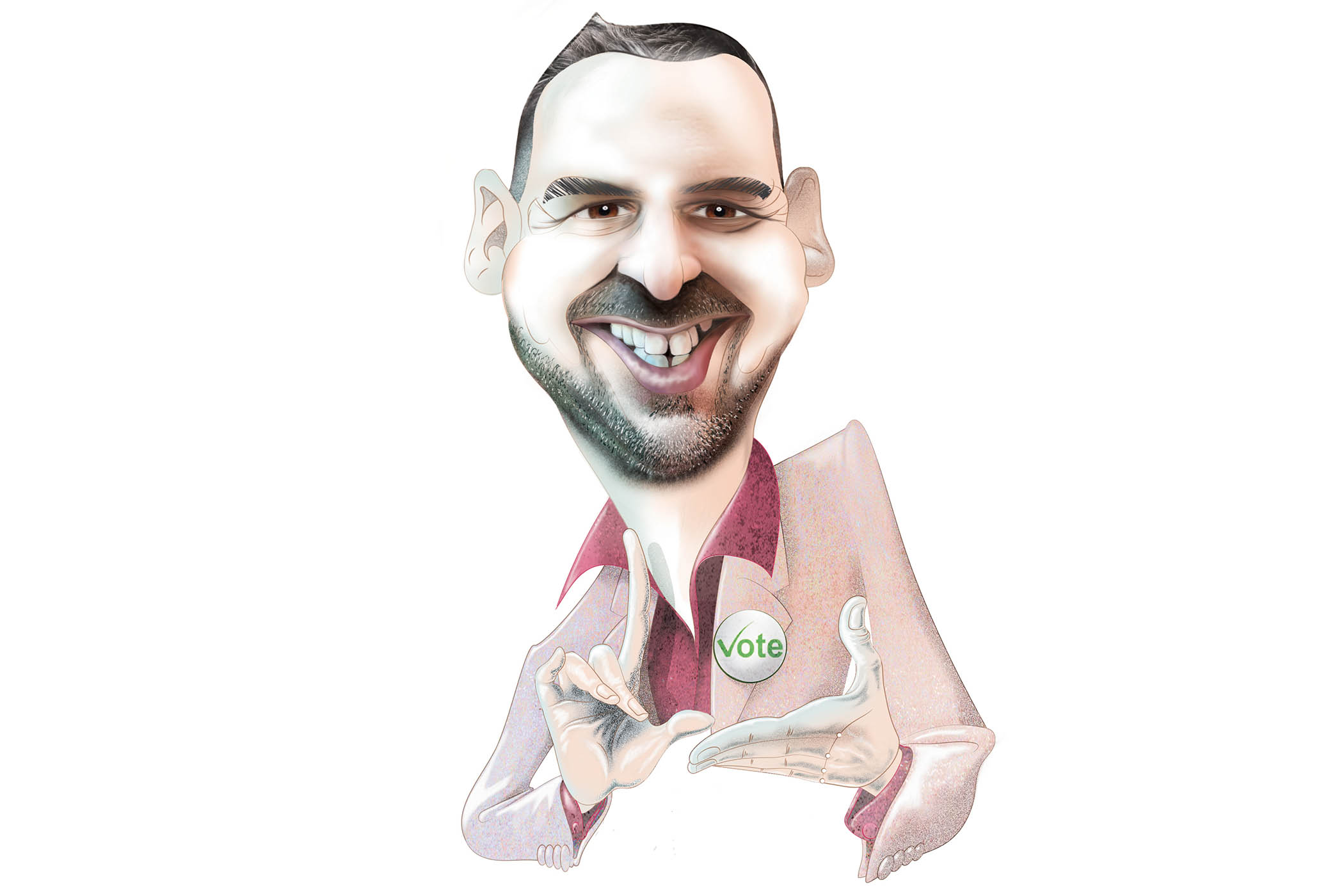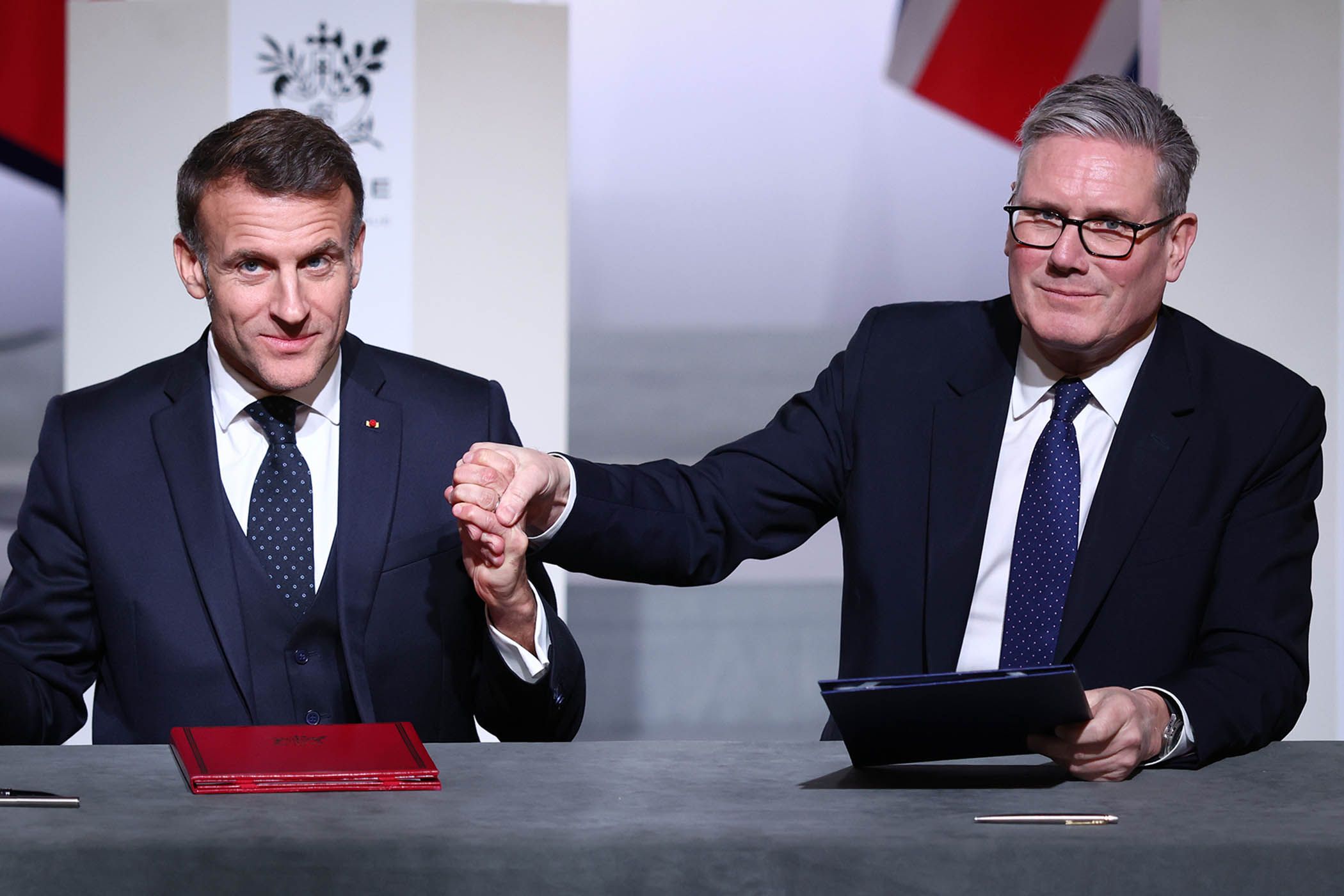Illustration by Andy Bunday
Last week, Zack Polanski, a 42-year-old gay Jewish vegan, became leader of the Green party with a promise to turn it into a leftwing version of Reform UK.
Back in May, after a poor showing in the local council elections, a government minister spoke of Labour’s good fortune that the Greens were useless: “If they had any kind of charismatic or populist leadership we’d be eight to 10 points further down in the polls.”
Polanski, who won by a landslide, may well be that leader. He is a proponent of “eco-populism”, a combination of leftwing economics and headline-grabbing presentation. Or, as he has also phrased it, “substance with clickbait”.
The term itself may well amount to more clickbait than substance, but part of the idea is to create a narrative with identifiable “baddies”. He wants to focus more on corporations and the super-rich for “destroying our environment, our communities, our democracy”. By the same token, he advocates playing down the environmental message, particularly in terms of personal responsibility, by targeting the government instead.
Constantly citing the climate crisis, he argues, is not the way to win the votes of people worried about their own economic plight. He is ready to attack the government’s net zero policies from the left, criticising expectations for “people to install heat pumps” or “get a train rather than a plane” if the latter is cheaper. In his leadership campaign, Polanski said the party, the fifth most popular in the UK, needed to tap into “people’s anger”. He would focus on “redistributing the wealth from the super-rich to fund public services, and calling out the genocide in Gaza”.
As political priorities go, they might well incite as much anger as they harness, but a divisive strategy has worked for Reform – which, despite having the same number of MPs as the Greens (just four) – leads the polls.
That success has much to do with the dominating personality of Nigel Farage. The Greens, however, have traditionally take n pride in their grassroots democracy rather than the popularity of their leaders. Will Polanski’s search for the spotlight cause tension?
Related articles:
“I don’t think so,” says Anthony Slaughter, the Welsh Green party leader, who has spent a lot of time with Polanski and his partner, Richie, who works in palliative care. “The party decides policy and strategy; the leaders are just messengers. And Zack is a very humble person, a team player.”
Former Green leader Natalie Bennett is all in favour of a shift to a more assertive approach. “As Greens, we’ve probably tended to be a bit too nice,” she says. “We need to be more sharper-edged, a bit spikier to be heard. I think that’s Zack’s message.”
Newsletters
Choose the newsletters you want to receive
View more
For information about how The Observer protects your data, read our Privacy Policy
One reason Polanski trounced his rivals for the leadership, the joint pairing of Adrian Ramsay and Ellie Chowns that makes up half of the parliamentary party, is that he took to social media with impassioned, emotive videos. Having worked in community theatre, he understands the power of simple messaging and a compelling vision – in this case of a world divided between the venal rich and exploited poor. The problem is that it’s a vision shared by Jeremy Corbyn and Zarah Sultana’s as yet nonexistent party, whose statement of intent is almost indistinguishable.
The problem is, his is a vision shared by Corbyn and Sultana’s party
The problem is, his is a vision shared by Corbyn and Sultana’s party
Two weeks ago, the new Green leader visited the Forward festival with Sultana. Last week, Corbyn warmly welcomed his “stunning victory” and said that he looked forward to working with him “to create a fairer, kinder world”.
It’s a long way from the day, nine years ago, when Polanski, then a Liberal Democrat member, heckled Corbyn at a Momentum rally, shouting: “What about Europe, Jeremy? Where were you when we needed you?”
Back then, members of the crowd denounced Polanski as a “piece of shit” and, far worse in the lexicon of leftwing insults, a “Tory”.
Now there is talk of the two parties forming a pact. In his leadership campaign, Polanksi seemed to be leaning in that direction, but he said last week that he would need to see some “very strong arguments” before supporting such a move.
The realistic choice is either some form of electoral agreement or a split of the big public spending, anti-growth, tax-the-rich vote. And if the Greens’ economic plan is informed by magical thinking, so is Reform’s, and that hasn’t held it back so far.
Bennett believes that, such is public disillusionment with mainstream politics, there are enough votes for both parties. She recalls Polanski as a Lib Dem standing in a byelection for Camden council and in the 2016 London assembly elections. “He was new and enthusiastic. I warmed to him.” He in turn was moved Greenwards by Bennett’s ardent defence of refugee rights.
His enthusiasm has led to trouble in the past, most notoriously in 2013 when he was working as a hypnotherapist. An undercover Sun reporter asked if he could make her think herself into having bigger breasts. Whatever took place in the session, he did not charge her for it and featured in the resulting piece, in which the reporter claimed her breasts grew for for 10 days after their meeting. He says he was misrepresented, but has nonetheless apologised for his part in the story.
Born David Paulden in Salford, Greater Manchester, Polanski changed his surname at 18 to the original family name. He says his grandfather abandoned it after arriving in the UK, to avoid antisemitism. As his stepfather was also a David, he chose Zack after a Jewish character in the children’s novel Goodnight Mister Tom.
He attended a private school, Stockport Grammar, and studied drama at Aberystwyth University before going to drama school in Atlanta, Georgia. It was in the American South, he said, that he witnessed growing racism and experienced explicit homophobia.
Back in the UK, he worked in community theatre before his turn as a hypnotherapist. He may well need all his theatrical and hypnotic powers to transform some of his convictions into popular policy. The Greens have long supported unilateral nuclear disarmament, but, even with eastern Europe under threat from an increasingly bellicose Russia, Polanski also wants to see the UK withdraw from Nato and an alternative arrangement of “peace and diplomacy”. Slaughter says Trump has changed everything by threatening to invade another Nato territory (Greenland), but that Polanski isn’t calling for the UK to leave Nato just yet. So after Trump has left office? “This is the moment, perhaps, for Europe to form a European defence alliance,” Slaughter says. It would mean far more defence spending. Is Polanski in favour of that? “We’re in favour of spending more on peace,” says Slaughter.
Then there’s freedom of expression and growing public resentment of policing tweets rather than streets. Last week, Polanski approved the arrest by five armed policemen of the comedy writer and gender critical activist Graham Linehan for three unpleasant tweets, describing it as “proportionate”. A more vocal stance on such positions might attract support in some urban constituencies – Polanski lives in Hackney – but, during the leadership campaign, Ramsay and Chowns warned it would alienate voters in rural seats like their own.
Polanski clearly believes that the party’s growth lies in Labour-held cities and towns rather than the Tory countryside. If he’s right, the polls will look very bleak indeed for the government.
Zack Polanski
Born 2 November 1982
Alma mater Aberystwyth University
Work Member of the London Assembly
Family Partner Richie



